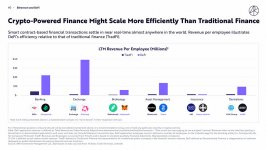You are using an out of date browser. It may not display this or other websites correctly.
You should upgrade or use an alternative browser.
You should upgrade or use an alternative browser.
The Metaverse
Clinamenic
Binary & Tweed
To my knowledge there is a non-trivial portion of the circulating supply of BTC that is lost, to this effect. Really it may not even make sense to consider this a portion of the circulating supply, and more a chaotic deflationary factor.
Clinamenic
Binary & Tweed
We've already reached a synthesis.
Clinamenic
Binary & Tweed
But maybe there are more technical arguments to be made re: use cases of decentralized databases.
vimothy
yurp
but you don't even know *what those problems are*It's a new set of protocols that developers can explore to solve problems, when and where decentralized databases, and the incentive models thereof, benefit a given business product or enterprise. I think that should be an uncontroversial assertion.
toko
Well-known member
First I will say I think the term "web3" is basically a way to get VC's to shill their bags. Even the term "metaverse" is stupid and misued.
on the contrary, "regulation" could be as simple as coming after known bad-actors and grifters, it doesn't entail a group that manages it, nor the loss of censorship resistance.look, it's just massively evident that whatever protections the blockchain model provides is not sufficient to prevent massive and ongoing fraud. so whatever potential future is entailed by these technologies it will necessarily entail central (a network of central, perhaps) authorities who manage it
if you truly think this then I understand all your other views. unfortunate I think this is way off the mark. first, the immutable data layer is only one part of crypto/web3, it also includes a way for trust minimized computation. i agree that there will not be one and only immutable db, but rather a hyperliquid network of chains which interoperate according to open source standards.I agree completely, but the space of problems that can be addressed only by a decentralized, immutable db is quite small
vimothy
yurp
fully agreedFirst I will say I think the term "web3" is basically a way to get VC's to shill their bags. Even the term "metaverse" is stupid
vimothy
yurp
so what is the point then, if it's not that?if you truly think this then I understand all your other views. unfortunate I think this is way off the mark. first, the immutable data layer is only one part of crypto/web3, it also includes a way for trust minimized computation. i agree that there will not be one and only immutable db, but rather a hyperliquid network of chains which interoperate according to open source standards.
vimothy
yurp
how?i.e finance will be much cheaper, have better u.x, serve more people
Clinamenic
Binary & Tweed
I mean case by case development challenges and needs faced by businesses, where some services (perhaps like IPFS, Akash, etc) can leverage decentralized databases to enable certain features that may be less feasible or affordable, in some cases, than centralized alternatives (i.e. AWS charging prohibitively high fees for data retrieval in some cases). Its a maximally broad assertion I'm making, but I do think its clear that a new set of tools only expands the technical capabilities of the tool-users, in this case the developers.but you don't even know *what those problems are*
Nobody is gonna force developers to use blockchain, and if they use it for gimmicky or trendy reasons, rather than actually ascertaining whether or not their business will benefit from them, then the performance of their business will reflect this suboptimality.

